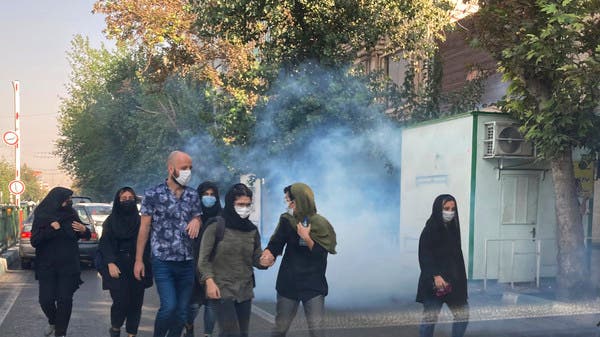According to Republican Senator Marsha Blackburn, a draught resolution supporting Iranian protestors who are carrying on their demonstrations despite an extraordinary crackdown has been filed to Congress.
“Iran keeps using deadly force on anti-regime protesters to keep them quiet as they struggle for their fundamental human rights. In order to aid the courageous female demonstrators in their fight for freedom, I submitted a resolution “she wrote on her Twitter page.
The tweet cited an article from the American daily “The Wall Street,” which claimed that the middle class is instigating the uprisings against the regime as a result of the nation’s crumbling economy.
Following the death on September 16 of Mahsa Amini, a 22-year-old woman who was jailed for allegedly breaking the nation’s strict dress code and passed away in custody, Iran’s sizable urban middle class has organised protests in dozens of locations.
Their complaints were coordinated through word-of-mouth and amplified on social media, and their demands for the abolition of the nation’s governing system, which dominates all facets of society, swiftly evolved beyond their initial demands concerning women’s rights.
Women, technology, and poverty, according to Mostafa Pakzad, a businessman in Tehran who counsels international companies on their business strategy in Iran, are the driving forces behind the demonstrations.
Because of the tremendous limitations they encounter, he continued, “young people feel that their lives are essentially wasted.”
After the Islamic revolution of 1979, Iran’s middle class served as a stabilising force and the country’s economic engine despite international sanctions imposed because of Iran’s nuclear programme, ballistic missile programme, support for terrorism, and backing for militias in the region.
Despite a terrible war and numerous oil price drops, Iran’s middle class has increased over the past forty years to make about 60% of the country’s population and has a robust educational system that produces doctors, attorneys, engineers, and merchants.
The middle class is currently seeing a 50% increase in inflation, and the value of the national currency has reached an all-time low this year.
Iran’s population is now more than 30% poor, up from 20% in 2015, while the middle class now only accounts for less than 50% of the population.
The economy and the failure to resurrect a global agreement that reduced sanctions on Iran in exchange for severe, temporary curbs on its nuclear programme have been the source of seething resentment for years.
Taking off her headscarf and joining thousands of other women in protest, a 52-year-old housewife in north Tehran stated, “The foundations of these rallies are economic concerns and today you see the explosion.”
She said that her husband and she had exhausted their savings. She stated that they had previously owned a number of homes, but some of them had been sold to earn cash.
Every two years, she used to buy a new automobile, replacing an older model with a new one, but she recently sold the vehicle for cash to pay off debt.
The majority of analysts concur that US sanctions aimed at Iran’s financial and energy sectors are the main cause of the Iranian economy’s deterioration and its isolation from the dollar.
However, a survey of 1,000 respondents conducted a year ago by the University of Maryland’s Center for International and Security Studies and IranPoll, a Canadian research and polling organisation focused on Iran, found that 63% of Iranians attribute the nation’s financial issues to domestic economic mismanagement and corruption rather than sanctions.
Iran formerly produced some of the most oil in the world, now it only produces 2.
5 million barrels per day, which is less than the 4 million and 6 million barrels per day from 2016 to the 1970s.
According to economists, hyperinflation outweighs any post-pandemic growth advantages. According to a research released last week by the International Monetary Fund, employment of college graduates decreased by 7% as a result of the sanctions, while the salaries of male skilled workers decreased by roughly 20%.
The morality police lit the flame, and the Iranian economy’s collapse fanned the protests, according to the report.

